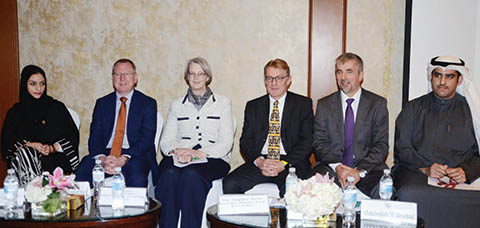 KUWAIT: Experts shared their experiences of railway projects and explained Kuwait and GCC countries' need for considering these projects for economic development at a seminar organized by the Kuwait Economic Society. The roundtable was titled 'Effective strategies of metro and railway projects' and held on Wednesday at the Regency Hotel. GCC member states are working on implementing railway projects to connect their cities and capitals with each other. Establishing the infrastructure is estimated to cost $15.4 billion.
KUWAIT: Experts shared their experiences of railway projects and explained Kuwait and GCC countries' need for considering these projects for economic development at a seminar organized by the Kuwait Economic Society. The roundtable was titled 'Effective strategies of metro and railway projects' and held on Wednesday at the Regency Hotel. GCC member states are working on implementing railway projects to connect their cities and capitals with each other. Establishing the infrastructure is estimated to cost $15.4 billion.
Steve Lankester of Parsons Brinckerhoff said Kuwait needs metro and railways projects to face continued expansion of new urban areas in the southern and northern parts of the country. "To realize such projects, we have to think about the land and spaces that we need to build on, and also consider structures for stations, tunnels and public areas. Metro projects need concerted efforts of both the private and public sectors as they have many technical details during the phases of construction," he explained. Lankester pointed out that metro projects need a number of technical steps which should be implemented accurately after conducting detailed studies on the goals of these projects.
Benefits
About the key benefits of the railway and metro projects, Nada Abu Al-Samh, a financial analyst at the GCC General Secretariat, explained that the projects will expand regional networks. "These projects will create a sustainable railway industry, develop a GCC railway network of 12,000 km, see investments of around $250 billion, create significant numbers of jobs (10,000), significant investment opportunities for economic diversification, and will strengthen economic and social integration in the GCC," she said. Samh added that the project will link all the GCC countries. The railway will start from Kuwait and wind through Saudi Arabia, Bahrain, Qatar and United Arab Emirates before ending in Oman.
John Thomas, Regulatory Affairs Advisor at UAE's Etihad Rail, said that an establishment was formed in Abu Dhabi in 2009 and a plan was formulated to transport passengers by rail and connect them with the six emirates. Added that the Etihad itself manages the infrastructure of the metro and this is a successful example in Abu Dhabi, advising all GCC countries to take the same steps.
Evaluation
Meanwhile, Connie Crawford, an expert in management of public transport projects at the Louis Berger Group, said there should be planning, construction and evaluation before setting up metro projects, adding that Kuwait is still designing the project and this will take time.
"A metro project in any country across the world includes expansion plans for several years - up to 100 - during which the system can be developed every few years to deal with growing population and urban expansion. Metro transport should be carried out in parallel with the development of cities to secure the maintenance of economic development, particularly in Kuwait," she explained.
Steven Webb, an expert at a French company specialized in metro projects' operation, said metro transport will lessen traffic jams GCC member states are suffering from, adding that the network in Kuwait will be connected with all GCC countries. "This needs full harmonization of all means of transport connected with the metro project. The system of public transport through buses will be integrated with metro networks in order to provide a complete service to citizens and residents as well," he pointed out.
By Faten Omar










